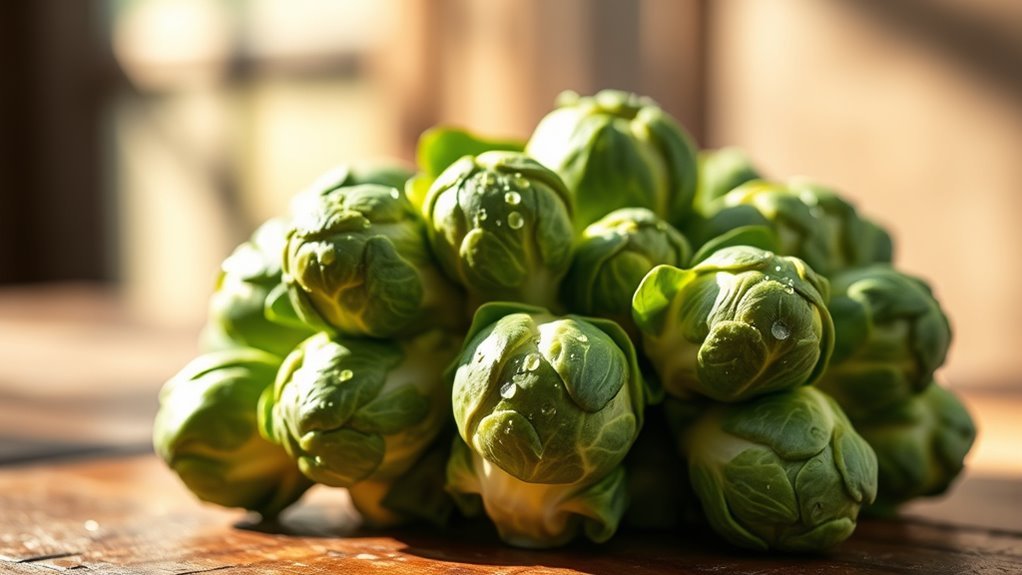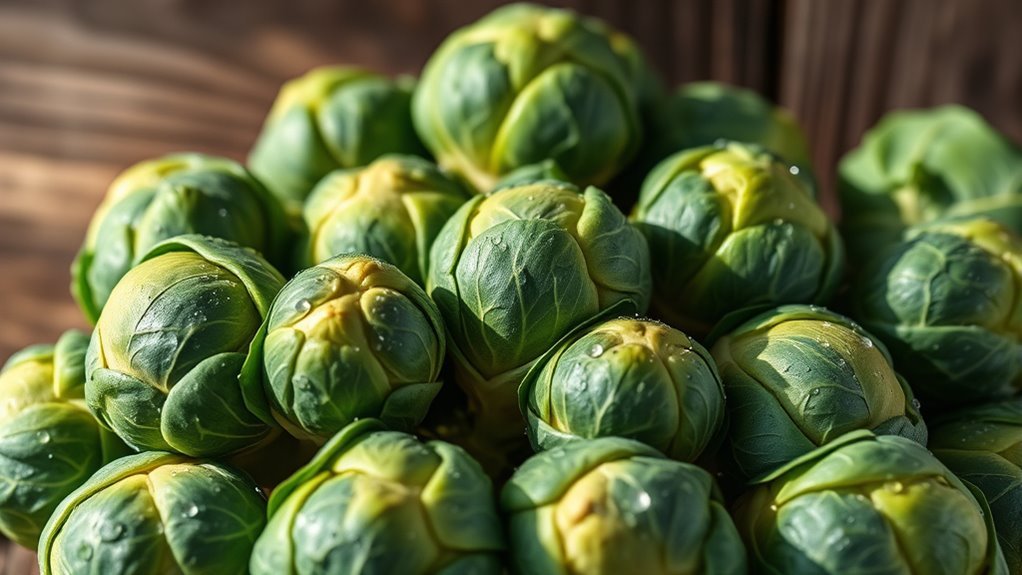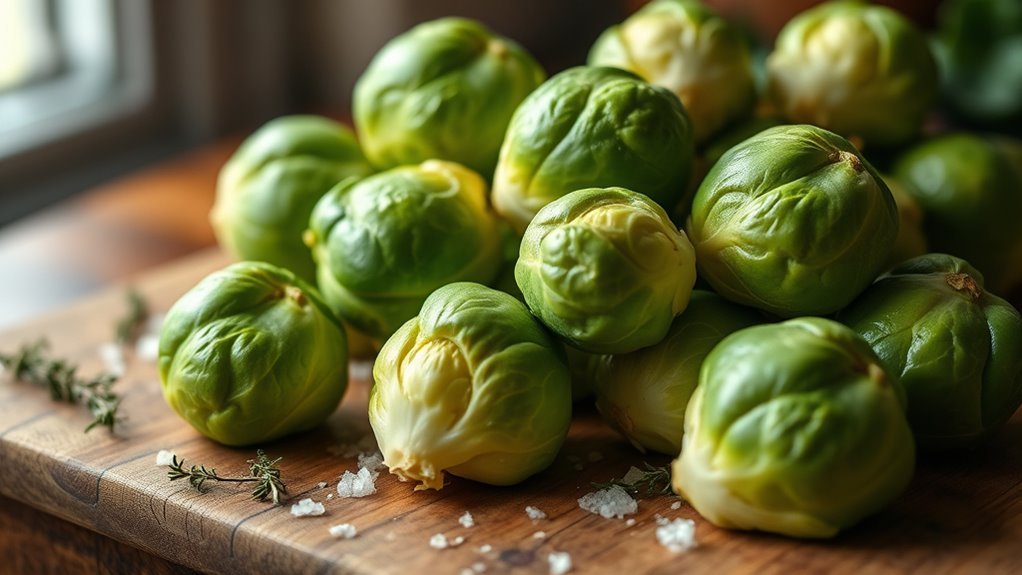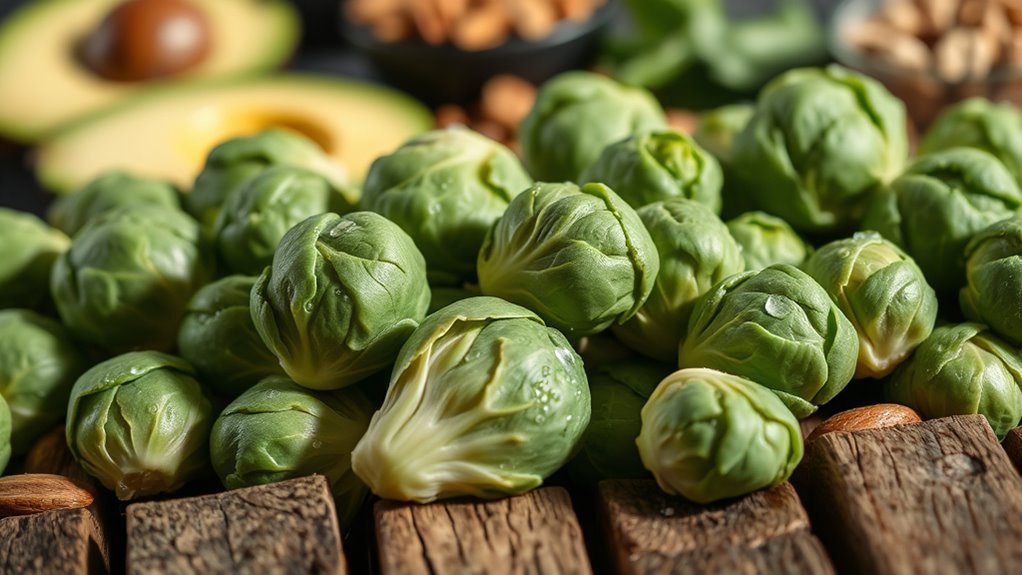Yes, Brussels sprouts are definitely keto-friendly! With only about 4-5 grams of net carbs per cooked cup, they’re a low-carb vegetable that provides essential nutrients like vitamins C and K. Their high fiber content aids digestion and helps you feel full, which is great for weight management. You can enjoy them in various cooking methods, making them versatile for your meals. If you’re curious about delicious recipes and cooking tips, there’s more to explore!
Nutritional Profile of Brussels Sprouts

Brussels sprouts are a nutritional powerhouse, making them an excellent choice for those following a keto diet. These tiny cabbages are low in carbs while being rich in vitamins C and K, fiber, and antioxidants. When you consider cooking methods, steaming or roasting can enhance their flavor while preserving nutrient retention. Avoid boiling, as it can lead to nutrient loss. Additionally, their high fiber content can promote digestive health and help you feel fuller longer, aligning perfectly with keto principles. Including Brussels sprouts in your meals not only supports your nutritional goals but also adds variety to your plate. So, whether you enjoy them sautéed or roasted, they’re a smart addition to your keto-friendly lifestyle.
Carbohydrate Content and Serving Size

When it comes to following a keto diet, understanding the carbohydrate content of foods is essential. Brussels sprouts are a great option, as they contain about 5 grams of net carbs per cup when cooked. This makes them suitable for carb counting, allowing you to enjoy them without exceeding your daily carb limit. For serving suggestions, consider roasting or steaming them to enhance their flavor while keeping them keto-friendly. Pairing them with healthy fats, like olive oil or butter, can help you stay within your macro goals. Remember, moderation is key; a generous serving can still fit into your diet, but it’s wise to track how they affect your overall carb intake. Enjoy them while maintaining your freedom!
Health Benefits of Brussels Sprouts

Brussels sprouts pack a powerful nutritional punch, offering vitamins, minerals, and fiber that can enhance your overall health. Their antioxidant properties help combat oxidative stress, while their high fiber content promotes digestive health. Including these vegetables in your diet can provide a range of benefits that support your wellness goals.
Nutritional Profile Overview
Packed with essential nutrients, Brussels sprouts are a powerhouse of health benefits that fit seamlessly into a keto-friendly diet. With just 38 calories per cup, they’re low in carbs, making them an ideal choice for those watching their carbohydrate intake. These little green gems are rich in vitamins C and K, supporting your immune system and bone health. You’ll also find fiber, which aids digestion and promotes a feeling of fullness, helping you stay satisfied on your keto journey. Additionally, Brussels sprouts contain folate and manganese, contributing to overall cellular function and metabolism. Incorporating these vegetables into your meals not only enhances flavor but also boosts your nutritional benefits, empowering you to enjoy a healthier lifestyle while embracing freedom in your food choices.
Antioxidant Properties
While you might think of Brussels sprouts as just another vegetable, their impressive antioxidant properties make them a valuable addition to your diet. These little green powerhouses are packed with antioxidant compounds, such as vitamin C, kaempferol, and glucosinolates, which help combat oxidative stress in your body. By including Brussels sprouts in your meals, you can potentially enhance your overall health and reduce the risk of chronic diseases like heart disease and cancer. Research indicates that these antioxidants may also support your immune system and promote healthy aging. So, if you’re looking for a delicious way to boost your antioxidant intake and enjoy the health benefits, Brussels sprouts should definitely be on your plate!
Digestive Health Benefits
Including Brussels sprouts in your diet not only boosts your antioxidant intake but also offers notable digestive health benefits. These little green gems are packed with fiber content, which is essential for maintaining gut health. Fiber acts as a prebiotic, feeding the beneficial bacteria in your digestive system. This can lead to improved digestion, regularity, and even reduced bloating.
Moreover, the high fiber content helps you feel fuller for longer, which can be beneficial if you’re watching your weight. Eating Brussels sprouts can also support a balanced gut microbiome, potentially lowering the risk of gastrointestinal issues. So, if you want to enhance your digestive health while enjoying a keto-friendly meal, adding Brussels sprouts to your plate is a smart choice!
How Brussels Sprouts Fit Into a Keto Diet
Brussels sprouts can be an excellent addition to a keto diet, as they are low in carbohydrates and high in fiber, making them a suitable choice for those aiming to maintain ketosis. With only about 4 grams of net carbs per cup, they fit well within your daily carb limit. Their versatility allows for various Brussels sprouts preparation methods, such as roasting, sautéing, or steaming, ensuring you can enjoy them in different ways. When it comes to keto meal pairing, they complement fatty proteins like bacon or salmon beautifully, enhancing both flavor and satiety. By incorporating Brussels sprouts into your meals, you can enrich your diet while staying committed to your keto lifestyle. Enjoy the freedom of tasty, healthy choices!
Delicious Keto-Friendly Brussels Sprout Recipes
If you’re looking for tasty ways to enjoy Brussels sprouts on a keto diet, you’ve got some great options. Roasted Brussels Sprouts Delight brings out their natural sweetness, while a Creamy Brussels Sprout Casserole adds a comforting twist. Both recipes are not only low in carbs but also packed with flavor, making them perfect additions to your meal plan.
Roasted Brussels Sprouts Delight
When you’re looking for a nutritious and satisfying side dish that fits perfectly into a keto diet, roasted Brussels sprouts should be at the top of your list. Their roasted flavor brings out the natural sweetness, while the crispy texture adds an appealing crunch. To make them, simply toss the sprouts with olive oil, salt, and pepper, then roast at 400°F until they’re golden brown and tender. You can also experiment by adding garlic or balsamic vinegar for extra depth. These little green gems are not only low in carbs but also packed with vitamins C and K. Enjoy them alongside your favorite protein for a well-rounded, keto-friendly meal that won’t leave you feeling deprived.
Creamy Brussels Sprout Casserole
Transform your dinner routine with a creamy Brussels sprout casserole that’s not only delicious but also fits seamlessly into your keto lifestyle. This dish combines the rich, creamy texture of cheese and heavy cream, enveloping tender Brussels sprouts for a satisfying meal. You can easily customize it with your favorite casserole toppings—like crispy bacon or almond flour for a crunchy contrast—making it a versatile option. Plus, Brussels sprouts are low in carbs and high in fiber, which means you can enjoy this dish guilt-free. Serve it as a side or a main dish, and watch how it becomes a family favorite. With its indulgent taste and keto-friendly profile, it’s a win-win for your dinner table!
Tips for Cooking Brussels Sprouts on a Keto Diet
Though Brussels sprouts are often overlooked, they’re a fantastic addition to a keto diet due to their low carbohydrate content and high fiber. To make the most of them, explore various cooking techniques like roasting, steaming, or sautéing. Roasting brings out their natural sweetness, while sautéing allows for quick preparation. Don’t shy away from creative flavor pairings; bacon, garlic, and parmesan cheese complement Brussels sprouts beautifully, enhancing their taste without adding carbs. For a fresh twist, try lemon juice or balsamic vinegar to brighten the dish. Remember, the right seasoning can elevate your meal while keeping it keto-friendly. Embrace these tips, and enjoy Brussels sprouts as a delicious, nutritious staple on your keto journey!
Possible Considerations for Including Brussels Sprouts in Your Diet
Including Brussels sprouts in your diet can offer several health benefits, especially when you’re following a keto lifestyle. These nutrient-dense vegetables come in various Brussels sprout varieties, providing a range of flavors and textures. When considering how to incorporate them, think about different cooking techniques. Roasting can enhance their natural sweetness, while steaming preserves nutrients.
However, it’s crucial to monitor portion sizes, as excessive consumption might lead to digestive discomfort for some. Also, pairing Brussels sprouts with healthy fats, like olive oil or avocado, can make them more keto-friendly. Balancing these factors allows you to enjoy their benefits while maintaining your dietary goals. Embrace the versatility of Brussels sprouts and experiment with them in your meals!
Frequently Asked Questions
Can Brussels Sprouts Cause Digestive Issues on a Keto Diet?
Brussels sprouts can cause digestive issues for some people on a keto diet due to their high fiber content. While fiber is beneficial for digestion, it might lead to gastric effects like bloating or gas, especially if you’re not used to it. If you experience discomfort, consider reducing your intake or cooking them thoroughly, which can help break down some of the fiber. Listen to your body and adjust accordingly for a more comfortable experience.
Are Frozen Brussels Sprouts as Healthy as Fresh Ones?
Frozen Brussels sprouts can be just as healthy as fresh ones, offering you convenient frozen benefits. When they’re flash-frozen shortly after harvest, they retain most of their nutrients, meaning you won’t miss out on essential vitamins. While fresh produce might taste better in some dishes, frozen sprouts maintain their nutritional value, allowing you to enjoy their goodness without the hassle of spoilage. So, whether fresh or frozen, you’ll still be nourishing your body.
How Should Brussels Sprouts Be Stored for Freshness?
To keep your Brussels sprouts fresh, store them in the refrigerator, ideally in a perforated plastic bag. This allows for airflow while retaining moisture. Avoid washing them until you’re ready to use them, as excess moisture can lead to spoilage. For longer storage, consider blanching and freezing. Following these storage methods and freshness tips can help you enjoy those delicious sprouts for weeks, preventing waste and ensuring you always have them on hand.
Do Brussels Sprouts Have Any Allergens to Be Aware Of?
Brussels sprouts can be a delightful addition to your meals, but they do come with some potential allergens. While most people enjoy them without issues, those with certain intolerances, like cruciferous vegetable sensitivity, might experience digestive discomfort. It’s important to listen to your body. If you notice any adverse reactions, it could point to a Brussels sprouts intolerance. Always consult with a healthcare provider if you’re unsure about specific food allergies. Enjoy your veggies!
Can I Eat Brussels Sprouts Raw on a Keto Diet?
Yes, you can eat raw Brussels sprouts on a keto diet! They’re low in carbs and packed with nutrients. Eating them raw offers benefits like preserving their vitamin C content. You can toss them into keto salad recipes for a crunchy texture and added fiber. Just make sure to slice them thinly to enhance their flavor and digestibility. Enjoy experimenting with different dressings to keep your meals fresh and exciting!
Frequently Asked Questions about Brussel Sprouts and Keto Diet
1. Are Brussel sprouts keto-friendly?
Yes, Brussel sprouts are keto-friendly. They are low in carbohydrates and high in fiber, making them a great vegetable choice for those following a ketogenic diet. One cup of cooked Brussel sprouts contains approximately 8 grams of carbohydrates, of which 4 grams are fiber, resulting in a net carb count of around 4 grams.
2. How many carbs are in Brussel sprouts?
One cup of cooked Brussel sprouts contains about 8 grams of total carbohydrates. After accounting for the 4 grams of dietary fiber, the net carbs amount to roughly 4 grams per serving, making them a suitable addition to a low-carb diet.
3. What are the health benefits of eating Brussel sprouts on a keto diet?
Brussel sprouts are rich in vitamins C and K, antioxidants, and other beneficial compounds. They support immune function, improve gut health due to their high fiber content, and may aid in reducing inflammation. Including them in a keto diet can help meet nutritional needs while keeping carb intake low.
4. How can I prepare Brussel sprouts for a keto meal?
Brussel sprouts can be prepared in various delicious ways suitable for a keto diet. You can roast them with olive oil and seasonings, sauté them with garlic and butter, or even incorporate them into casseroles. Adding cheese, bacon, or nuts can enhance their flavor and fit well within keto meal plans.
5. Can I eat too many Brussel sprouts on a keto diet?
While Brussel sprouts are low in carbs, it’s important to consume them in moderation as part of a balanced diet. Eating excessive amounts may lead to digestive discomfort due to their high fiber content. It’s best to enjoy them as one of several vegetables to ensure you’re getting a variety of nutrients.
References
- https://www.healthline.com/nutrition/brussels-sprouts-keto-friendly
- https://www.medicalnewstoday.com/articles/brussels-sprouts-nutrition
- https://www.ncbi.nlm.nih.gov/pmc/articles/PMC6340310/
- https://www.eatright.org/health/wellness/healthy-eating/brussels-sprouts-nutrition-facts
- https://www.webmd.com/diet/health-benefits-brussels-sprouts
- https://www.vegetablegardener.com/item/2612/brussels-sprouts-nutrition-facts
- https://www.verywellfit.com/are-brussels-sprouts-keto-friendly-5196988


